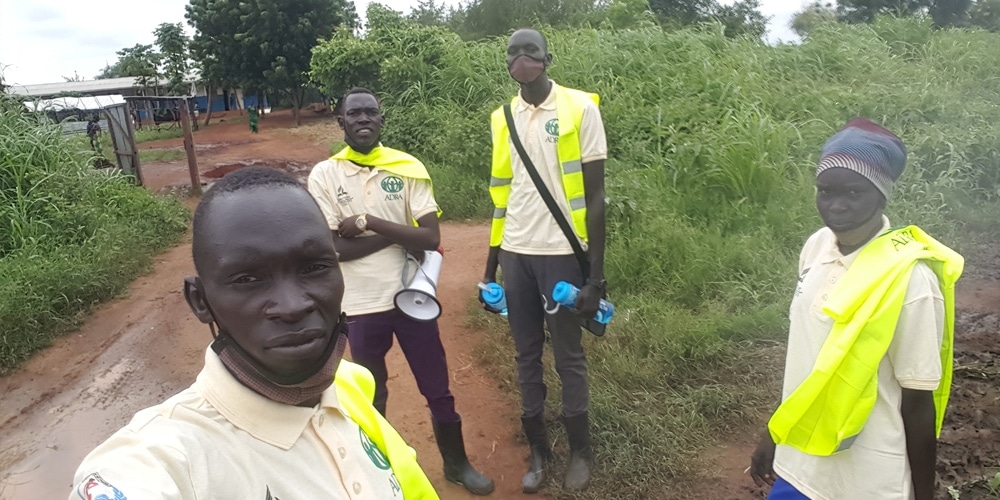
For nine months starting in August 2021, the Adventist Development and Relief Agency (ADRA) will implement several initiatives in Maiwut, South Sudan, to tackle the effects of the pandemic on schools and small businesses.
The initiatives, known locally as the COVID-19 Response Project or CORE, will include COVID-19 safe-learning campaigns, increased capital for vendors who lost their businesses, and social behavior interventions within school systems. ADRA will partner with local Adventist churches, primary schools, and health centers to offer training and mentoring.
Maiwut borders Ethiopia and South Sudan and has been met with civil unrest since 2013. As a result of the conflict, people have been internally displaced, lives have been lost, cattle stolen, and property damaged. In 2019, the country was at peace, and an influx of returnees from Ethiopia and Sudan overwhelmed the country.
When the COVID-19 pandemic began in early 2020, a coronavirus outbreak in March resulted in a country-wide lockdown. Schools were forced to close, and restrictions were enforced on public gatherings and traveling. Numerous businesses also had to shut down, and imported goods could no longer cross the border.
“The most affected people are the elderly, children, women, and individuals with disabilities,” John Mwanza, ADRA’s country director in South Sudan, said. “Their income dropped significantly due to the loss of livelihood opportunities, especially business.”
Mwanza added that older adults and people with disabilities lacked access to COVID-19 information due to their impairment challenges. In addition, the closure of schools exposed children to risks of child labor, an increase in teen pregnancy, and forced marriages.
“The issue is that some communities received on-hand information about COVID-19 prevention, but they weren’t practicing it,” Mwanza said. “South Sudan has started vaccination processes in April, but in other states like Maiwut, they do not have vaccines due to limited supply. There is also massive misinformation about the vaccines, with many claiming they are neither safe nor effective.”
He said that schools have begun reopening but will require safe and conducive environments for students, teachers, and staff.
“Given the long term of children staying home, there is a high likelihood that parents may not prioritize sending their children back to school, and children may be reluctant to enroll. Significant time was lost when schools were closed for over a year that may likely affect them when they undertake exams by the end of the year,” Mwanza said.
ADRA conducted a needs assessment to further understand how school environments can be safe for learning as schools reopen. The other area assessed included the effect of COVID-19 on livelihoods for targeted populations.
“What we found was that we needed the collaboration of other organizations to assist in tackling these two issues. Our strategy is to work with local Adventist churches, community leaders, local authorities, youth, and women’s groups. We want to maximize any chance for the most vulnerable in the Maiwut county to recover from disrupted livelihoods and get them access to COVID-19 prevention methods,” Mwanza said.
Mwanza added that ADRA, through collaborations with partners, will begin by conducting training for influencers, including education personnel, church leaders and volunteers, licensed medical workers, and community groups about COVID-19 prevention, gender-based violence, child protection, and more. This training is meant to arm these groups with knowledge and skills as they work among affected residents.
In addition, ADRA plans to make 60 handwashing facilities available, of which 40 will be placed in at-risk communities for the coronavirus and 20 in targeted schools. These facilities will be equipped with soap and water, reusable face masks, and hand sanitizers.
Mwanza said that ADRA will also incentivize teachers to implement COVID-19 prevention training to students while school is in session. Additionally, ADRA will provide capital of US$200 for 150 households who lost their small businesses due to the pandemic. The outreach effort will also use mass communication to reach a wider audience in a timely manner.
“Through these initiatives based on our study, ADRA aims to increase coverage about COVID-19 prevention. COVID-19 is one of the most serious viruses this world has faced. We want it to end and are doing all that we can to ensure communities stay safe for the long term,” he said.
The original version of this story was posted by the Adventist Development and Relief Agency.